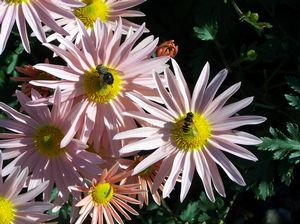Printed at http://www.quackingrassnursery.com/index.cfm/
Chrysanthemum 'Hillside Sheffield Pink'
Hardy Mum
Plant Type:
SUN PERENNIALSChrysanthemum ‘Hillside Sheffield Pink’ – ‘Hillside Sheffield Pink’ is a beautiful selection from Fred and Mary Ann McGourty in Connecticut. It sports large single bright salmon-pink flowers with a central yellow disk poised over very neat and attractively cut glossy dark green foliage. We find ‘Hillside Sheffield Pink’ a knockout with Persicaria amplexicaulis ‘Firetail’ and Eupatorium rugosum ‘Chocolate’ as well as any Hydrangea quercifolia cultivar in autumn. One of our customers, Sharma, uses ‘Hillside Sheffield Pink’ to great effect with Itea virginica ‘Little Henry’. She says the two just “pop”! It was a happy accident, but when the foliage of the Itea turns, that is the time ‘Sheffield’ blooms.” Spring planting recommended. All of our cultivars are propagated by cuttings and are pot-grown.
We strongly recommend spring planting in colder regions so that the plants will be well-established by the time cold weather arrives. Cut them back to a lower leaf axil by mid-July in the north, earlier farther south; doing so will result in better-branched plants on a more compact habit adorned with even more flowers at season’s end. But if you don’t, regardless, you’ll have multitudes of flowers on longer stems but possibly more decumbent plants. All of our mums will gradually ground cover into larger and larger mats. Plant all mums in full to part sun in fertile draining soil. Honeybees love them as this is one of the last flowering perennials to bloom in such abundance in the autumn in New England, along with some of the later asters.
Characteristics and Attributes for Chrysanthemum 'Hillside Sheffield Pink'
Season of Interest (Flowering)
- Autumn
Season of Interest (Foliage)
- Spring / Summer / Autumn
Nature Attraction
- Honey Bees & Native Bees
Light
- Full Sun
Attributes
- Border
- Massing
- Natural Garden
- Wildlife Garden
Growth Rate in the Garden
- Medium
Soil
- Average
- Draining
- Fertile
Origins
- Garden Origin
Propagated By
- Cutting Grown
Genus Overview: Chrysanthemum
All of our mums are hardy in USDA zone 5. We strongly recommend spring planting in colder regions so that the plants will be well-established by the time cold weather arrives. Cut them back to a lower leaf axil by mid-July in the north, earlier farther south; doing so will result in better-branched plants on a more compact habit adorned with even more flowers at season’s end. But if you don’t, regardless, you’ll have multitudes of flowers on longer stems but possibly more decumbent plants. Plant all mums in full to part sun in fertile draining soil. Honeybees love them as this is one of the last flowering perennials to bloom in such abundance in the autumn in New England, along with some of the later asters. The heights given are flexible, determined by the conditions in which they are planted and if pruned. All of our cultivars are propagated by cuttings and are pot-grown.



